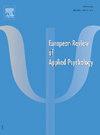衡量计算机思维的习得:两个工具的设计和验证
IF 1.4
4区 心理学
Q3 PSYCHOLOGY, APPLIED
European Review of Applied Psychology-Revue Europeenne De Psychologie Appliquee
Pub Date : 2025-09-24
DOI:10.1016/j.erap.2025.101116
引用次数: 0
摘要
编程的学习和计算思维的发展现在是世界上许多学校系统的教育目标的一部分。然而,对计算思维的定义缺乏共识,使得在学校环境中评估其习得变得复杂。本文的目的是提出两种适合法语学校背景的计算思维评估工具,并明确区分两个基本维度:对编程概念的掌握和解决算法问题的能力。方法设计了两个测试:计算概念掌握测试,侧重于编程概念的知识;算法测试,评估解决算法问题的能力。这些工具是用法语开发的,并使用心理测量分析进行验证。结果两个测试在信度和效度上都具有良好的心理测量特性。这两种工具为现有的工具提供了一种相关的替代方案,这些工具通常不适合法语环境,或者在测试时间方面要求太高。它们有助于在学校环境中对计算思维进行更精确的评估。本文章由计算机程序翻译,如有差异,请以英文原文为准。
Mesurer l’acquisition de la pensée informatique : conception et validation de deux instruments
Introduction
The learning of programming and the development of computational thinking are now part of the educational objectives in many school systems around the world. However, the lack of consensus on the definition of computational thinking complicates the assessment of its acquisition in a school context.
Objective
The aim of this article is to propose two assessment instruments for computational thinking adapted to the French-speaking school context, with a clear distinction between two fundamental dimensions: mastery of programming concepts and the ability to solve algorithmic problems.
Method
Two tests were designed: the Mastery of Computational Concepts Test, focusing on knowledge of programming concepts, and the Algorithmic Test, assessing the ability to solve algorithmic problems. These instruments were developed in French and validated using psychometric analyses.
Results
Both tests were found to have good psychometric properties, both in terms of reliability and validity.
Conclusion
These two instruments offer a relevant alternative to existing tools, which are often ill-suited to French-speaking contexts or too demanding in terms of test-taking time. They can contribute to a more refined assessment of computational thinking in the school context.
求助全文
通过发布文献求助,成功后即可免费获取论文全文。
去求助
来源期刊

European Review of Applied Psychology-Revue Europeenne De Psychologie Appliquee
PSYCHOLOGY, APPLIED-
CiteScore
2.20
自引率
20.00%
发文量
38
期刊介绍:
The aim of the Revue européenne de Psychologie appliquée / European Review of Applied Psychology is to promote high-quality applications of psychology to all areas of specialization, and to foster exchange among researchers and professionals. Its policy is to attract a wide range of contributions, including empirical research, overviews of target issues, case studies, descriptions of instruments for research and diagnosis, and theoretical work related to applied psychology. In all cases, authors will refer to published and verificable facts, whether established in the study being reported or in earlier publications.
 求助内容:
求助内容: 应助结果提醒方式:
应助结果提醒方式:


